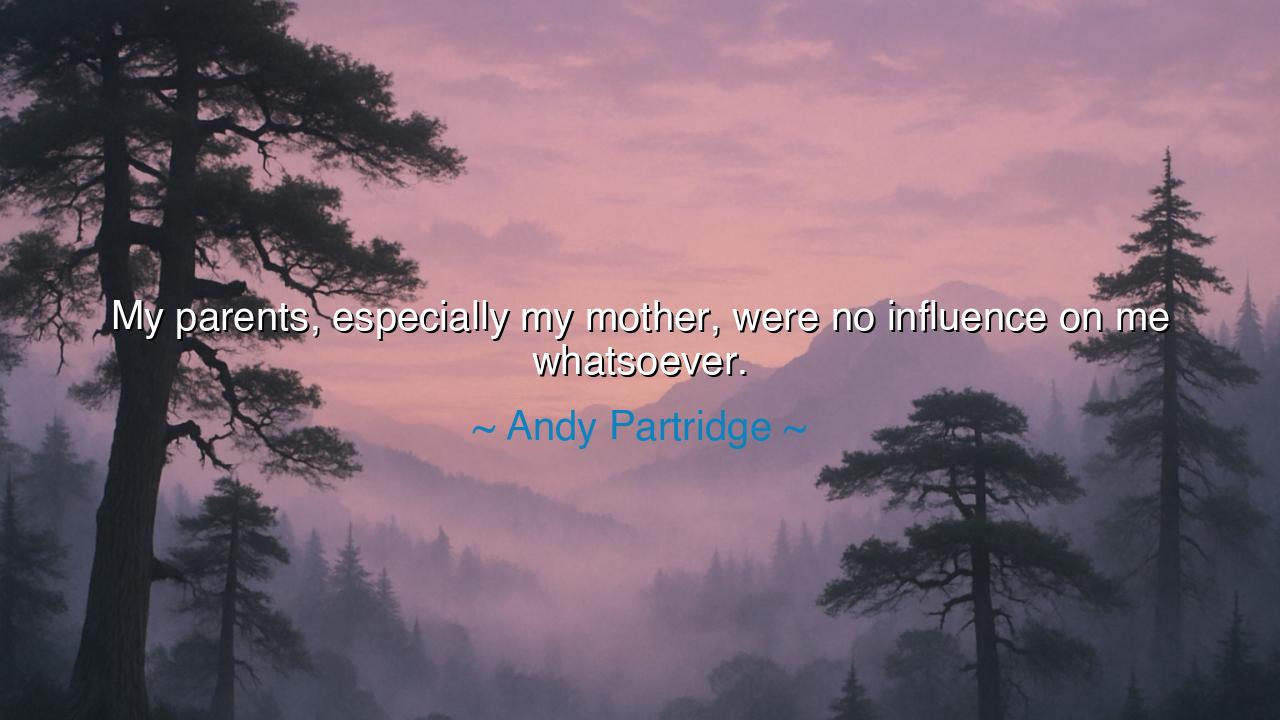
My parents, especially my mother, were no influence on me






In the piercing and paradoxical words of Andy Partridge, “My parents, especially my mother, were no influence on me whatsoever,” there echoes a strange kind of defiance—one that conceals a deeper yearning beneath its sharpness. To say that one’s parents had “no influence” is, on the surface, a declaration of independence; yet beneath it lies the shadow of the very bond it seeks to deny. The soul that proclaims such distance often does so not out of coldness, but out of survival—a way to affirm one’s own creation in a world where love, guidance, or understanding were perhaps withheld. This quote is the cry of a spirit that has forged its own path, unassisted and unshaped, except by its own will.
Andy Partridge, known as the creative mind behind the band XTC, was an artist born of contradictions—discipline and rebellion, melody and dissonance. His words, though harsh, reflect the condition of the self-made soul: the artist who emerges not because of nurture, but in spite of its absence. The origin of this quote lies not in arrogance, but in estrangement—the experience of one who felt unseen by those meant to see most clearly. It speaks to the loneliness that breeds creation, the fire that kindles in the hearts of those who must teach themselves what others were never taught to give.
The ancients knew that even rejection can be a teacher. The philosopher Diogenes, scorned by society, lived in poverty by choice and mocked the norms of his age. When asked who had taught him virtue, he replied, “The follies of others.” In this same way, Partridge’s declaration becomes a paradoxical acknowledgment: that non-influence itself can be a form of influence. The absence of nurture becomes a lesson in self-reliance. The coldness of distance becomes the forge of independence. For the child who grows without guidance must become their own mentor, their own comforter, their own creator.
Yet, beneath the armor of such independence, there is sorrow. To say that one’s mother was “no influence whatsoever” is to reveal a wound deeper than neglect—it is the mourning of what could have been. It is a lament spoken through denial, a defense against disappointment. The artist who utters these words carries both rebellion and grief in the same breath. For even the strongest among us are shaped by what we lacked; even our rejections are monuments to what we once desired. The heart that claims no influence is often one that has felt too much.
Consider the life of Jean-Jacques Rousseau, the philosopher who transformed modern thought yet lived a life marked by conflict with his family and society. Abandoned by his father and orphaned early, Rousseau declared himself self-taught, beholden to no lineage or mentor. Yet in his writings on education and nature, we sense his longing for the nurture he never knew. His brilliance was born from isolation, but his wisdom came from understanding its pain. So too with Partridge—his creative voice, sharp and unyielding, was forged not by inheritance but by rebellion against what failed to inspire him.
The lesson in these words, then, is not to glorify estrangement, but to recognize the alchemy of adversity. Some are born into warmth and are guided by gentle hands; others must walk the path alone and find light in the dark. If your life has lacked guidance, then let that absence become your teacher. If you were not shown love, then become the embodiment of it. If you were not inspired, then let your very existence be your act of creation. The human spirit is vast enough to turn even neglect into strength, even silence into song.
Let us also remember compassion—for those who raised us were themselves shaped by their own storms. Perhaps Partridge’s mother, like many before her, carried wounds too deep to heal, and thus passed on the silence she inherited. To understand this is not to excuse, but to release. The freedom of the soul lies not in denying our past, but in transcending it—to take what was broken and build anew.
So the teaching endures: you are not defined by who failed to shape you, but by what you chose to become. If you were given little, create abundance. If you were left unguided, become a light for others. Like Partridge, you may find that your greatest influence was the void itself—the emptiness that demanded you fill it with meaning. For in the end, even the absence of love can be the beginning of strength, and the soul that survives such beginnings becomes, in truth, its own parent, its own teacher, and its own creation.






AAdministratorAdministrator
Welcome, honored guests. Please leave a comment, we will respond soon